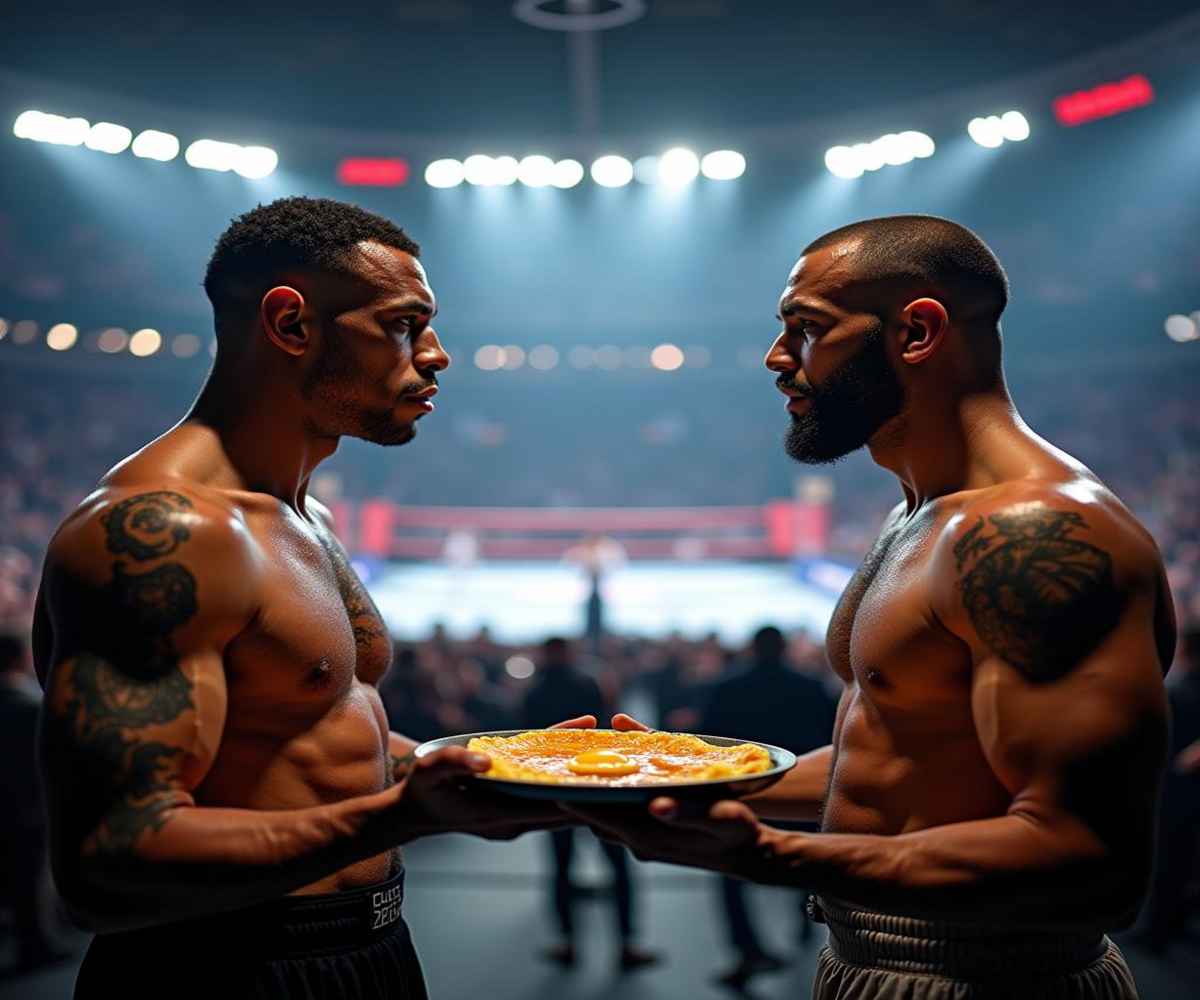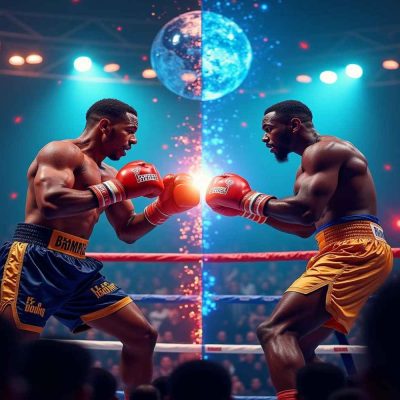“Mental Warfare: The Art of Trash Talk in Benn vs. Eubank Jr.”
In boxing’s theater of war, where fists and words collide with equal ferocity, trash talk isn’t just noise—it’s a scalpel. For Chris Eubank Jr. and Conor Benn, whose April 2025 clash at Tottenham Hotspur Stadium simmers with generational animosity, verbal jabs have drawn more blood than left hooks. From egg-smeared press conferences to social media grenades, their feud has rewritten the playbook on psychological combat. But beneath the theatrics lies a chilling question: In a sport where mental fractures precede physical ones, can words alone break a fighter before the bell rings?
The DNA of Disrespect: Boxing’s Love Affair with Trash Talk
Trash talk is boxing’s oldest weapon. Muhammad Ali weaponized poetry to dismantle Sonny Liston’s menace. Tyson Fury clowns opponents into doubting their own IQ. For Eubank Jr. and Benn, it’s genetic. Their fathers, Nigel Benn and Chris Eubank Sr., turned 1990s press conferences into Shakespearean duels—Eubank Sr. with his monocle and withering wit, Benn with snarling threats. The sons inherited not just their names, but a blueprint for chaos.
Yet modern trash talk is a different beast. Social media amplifies every sneer, and fighters like Eubank Jr. curate personas as meticulously as punch combinations. When Benn taunted Eubank Jr. in a TikTok clip—dubbing him “Grandpa Gloves”—the video racked 2.1 million views overnight, morphing a petty insult into a narrative. “It’s not about what you say,” PR strategist Lucy Heath told XKT. “It’s about making the world repeat it.”
Eubank Jr.: The Arsonist of Ego
Chris Eubank Jr. doesn’t just trash-talk—he architects humiliation. His 2023 egg prank, where he smashed an omelet into Benn’s face at a presser, wasn’t spontaneity; it was calculated theater. The clip, replayed 8 million times on YouTube, reduced Benn to a meme (“Omelette Boy”) while framing Eubank as the unflappable provocateur. “It’s about control,” Eubank told SecondsOut. “Make them flinch before they’ve thrown a punch.”
His tactics blend his father’s cerebral taunts with reality-TV ruthlessness. When Benn’s doping scandal erupted, Eubank didn’t just criticize—he monetized. Selling “Eggs Benedict” T-shirts on his website, he turned Benn’s disgrace into merch. For Eubank, trash talk is a triple threat: psychological edge, brand-building, and legacy-polishing. “He’s not just fighting Conor,” noted analyst Teddy Atlas. “He’s auditioning for history.”
Benn’s Counterpunch: Silence as a Sword
Conor Benn’s approach? Weaponized stillness. Once a firecracker—see his 2021 meltdown when Eubank mocked his padded record—Benn now channels stoicism. His social media, once a riot of clapbacks, now posts Spartan training clips set to ambient music. When Eubank Jr. goaded him about the doping saga on Good Morning Britain, Benn stared silently before deadpanning, “Your dad wore high heels.” The burn, subtle and surgical, trended for days.
This pivot isn’t accidental. After the egg incident, Benn hired sports psychologist Dr. Leah Lagos, who reframed trash talk as “energy theft.” “Reacting fuels their fire,” Lagos explained in a YouTube interview. “Silence starves it.” The strategy mirrors Khabib Nurmagomedov’s icy focus before fights—a stark contrast to Eubank’s circus. But does it work? Benn’s camp claims yes: “Eubank’s ranting to ghosts,” trainer Brian McIntyre told BoxingScene. “Conor’s in his head rent-free.”
The Viral Vortex: How Social Media Distorts the Mind Games
Modern trash talk lives online, where context dies in seconds. When Benn posted a sparring clip captioned “Eubank’s dentist will need overtime,” fans dissected it like the Zapruder film. Eubank’s retort—a Photoshopped image of Benn as Humpty Dumpty—garnered more engagement than his fight announcements. Platforms like TikTok reward cruelty condensed into 15 seconds, forcing fighters to compress their psyche wars into digestible burns.
But virality has a cost. Benn’s “Omelette Boy” tag still trends whenever he fights, a reminder that the internet immortalizes shame. Eubank, meanwhile, battles perceptions of arrogance—a TikTok edit of his “Who needs charisma?” rant has been parodied by comedians and politicians alike. “Every tweet is a tattoo,” warned digital strategist Marcus Johns. “You can’t scrub it off when the fight’s done.”
The Psychology: When Words Become Wounds
Trash talk’s power lies in its ambiguity. Is Eubank Jr. truly unbothered, or is his bravado a mask for insecurity? Does Benn’s silence signal focus, or repression? Sports psychologists split on the impact. Dr. Lagos argues trash talk backfires if it’s forced: “See Anthony Joshua vs. Andy Ruiz I—AJ’s forced ‘bad boy’ act drained him.” Others, like Dr. Jonathan Fader, insist provocation primes fighters: “Adrenaline from anger sharpens reflexes—if harnessed.”
For Benn and Eubank, their styles reflect deeper narratives. Eubank, 35, trash-talks like a man chasing legacy—his jabs at Benn’s résumé echo his own struggles to escape his father’s shadow. Benn, 28, clams up like a fighter desperate to prove he’s evolved. “Their words aren’t just tactics,” noted The Ring’s Tom Gray. “They’re diaries.”
The Precedent: When Talk Trumps Talent
History warns that mental warfare can eclipse skill. Remember Ali vs. Terrell? Ali’s “What’s my name?” torture broke Ernie Terrell before the bell. But for every Ali, there’s a Buster Douglas—stoic underdogs who let fists answer. Benn vs. Eubank Jr. tests which archetype prevails.
Eubank’s camp bets on chaos. “Chris thrives in the zoo,” said promoter Kalle Sauerland. But Benn’s team wagers on karma. “Trash talk is a boomerang,” McIntyre warned. “Throw it carelessly, it cracks your jaw on the return.”
As fight night nears, the mind games crescendo. Eubank Jr. leaks sparring footage of Benn getting “dropped” (later debunked); Benn posts a mock Eubank obituary. Each volley pulls the public deeper into their labyrinth of loathing. Yet somewhere beneath the noise, two men prepare not just to fight, but to silence a lifetime of doubt—their own.
(To be continued in Part 2: Fight Night Mind Games—The Walk-In, the Stare-Down, and the Moment Words Die)
Mental Warfare: The Art of Trash Talk in Benn vs. Eubank Jr. (Continued)
In boxing’s theater of war, where fists and words collide with equal ferocity, trash talk isn’t just noise—it’s a scalpel. For Chris Eubank Jr. and Conor Benn, whose April 2025 clash at Tottenham Hotspur Stadium simmers with generational animosity, verbal jabs have drawn more blood than left hooks. From egg-smeared press conferences to social media grenades, their feud has rewritten the playbook on psychological combat. But beneath the theatrics lies a chilling question: In a sport where mental fractures precede physical ones, can words alone break a fighter before the bell rings?
Legacy and Shadow: The Burden of Fathers’ Feuds
The Benn-Eubank rivalry is a ghost story. Their fathers’ 1990s wars weren’t just fights; they were cultural events, defined by Nigel Benn’s primal intensity and Chris Eubank Sr.’s aristocratic taunts. For the sons, this legacy is both a crown and a cage. Eubank Jr., now 35, has spent his career clawing out of his father’s silhouette, his trash talk laced with desperation to eclipse a legend. Benn, 28, battles the opposite—a name synonymous with ferocity, yet one he’s accused of tarnishing during his doping scandal. “Their fathers’ ghosts are the third and fourth men in the ring,” wrote The Guardian’s Donald McRae.
This generational weight sharpens their verbal blades. When Eubank Jr. mocks Benn’s “tainted legacy,” he’s not just attacking Conor—he’s exorcizing his own insecurities. Benn’s retort—“Your dad quit on his stool”—is a scalding reminder that Eubank Sr.’s lone loss to Carl Thompson haunts Junior’s résumé. Every insult is a mirror, reflecting their shared fear of becoming footnotes in a saga they didn’t author.
The Economy of Insults: Monetizing Mentality
Trash talk isn’t just mental warfare—it’s big business. Eubank Jr.’s “Eggs Benedict” T-shirts, launched hours after the omelet incident, grossed $280,000 in 48 hours, per Forbes. Benn’s camp retaliated with “Silent But Violent” hoodies, netting six figures and proving that humiliation can be commodified. Social media amplifies the payoff: Eubank’s TikTok taunts have boosted his follower count by 40% since 2023, while Benn’s stoic training clips attract sponsorships from mindfulness apps like Calm.
The financial calculus reshapes how fighters engage. “Every viral moment is a potential payday,” said sports marketer Raj Chohan. “Eubank doesn’t just want to win the fight—he wants to own the meme economy.” But this mercenary approach risks diluting authenticity. When Benn partnered with mental health platform TalkSpace after his doping ban, critics called it damage control. “Fans smell opportunism,” warned PR strategist Lucy Heath in her XKT interview. “The best trash talk feels personal, not transactional.”
Training the Mind: Beyond the Physical Regimen
While Eubank Jr. weaponizes chaos, Benn’s camp has turned mental prep into a science. Dr. Leah Lagos, his sports psychologist, employs biofeedback tools to measure how insults affect his heart rate variability (HRV). “If Conor’s HRV spikes when Eubank’s name trends, we reroute his focus,” Lagos explained in a YouTube interview. Their drills include simulated press conferences where actors scream Eubank’s taunts while Benn practices breathwork.
Eubank, meanwhile, leans into improvisation. His coach, Brian McIntyre, told BoxingScene that sparring sessions include “chaos intervals”—sudden blasts of crowd noise or flashing lights—to mimic the sensory overload of fight night. “Chris needs the circus,” McIntyre said. “Silence makes him twitchy.” These contrasting methods underscore a divide in combat sports: Is mental toughness innate, or can it be programmed?
The Echo Chamber: Fans as Amplifiers and Judges
The crowd is no longer just spectators—they’re accomplices. When Eubank Jr. tweeted a poll asking fans to choose Benn’s ring walk song (“Cry Me a River” won with 62%), he weaponized their ridicule. Benn’s counter? A Change.org petition to ban eggs at Tottenham Hotspur Stadium, signed by 150,000 fans in a week. Social media transforms supporters into soldiers, drafting them into psyops that stretch beyond the ring.
But fan loyalty is fickle. Benn’s doping saga saw his Instagram followers plummet by 200,000 overnight, while Eubank’s “arrogant Brit” persona plays poorly in U.S. markets. “The crowd loves villains until they don’t,” said digital strategist Marcus Johns. “One bad meme can turn global support into global scorn.”
The Final Bell: Will the Mind Outlast the Body?
As April 2025 looms, the Benn-Eubank feud transcends boxing. It’s a case study in how modern athletes curate reality, blending ancestral grudges with viral marketing. Eubank Jr. wields words like a cudgel, aiming to fracture Benn’s psyche into clickable shards. Benn, the reformed firebrand, bets on silence as his shield—a gamble that his restraint will magnify Eubank’s hollowness.
Yet history offers no clear verdict. For every Ali who broke foes with poetry, there’s a Leonard who let his fists narrate. The answer lies not in their tweets or TikToks, but in the moment the bell rings—when personas dissolve, and only pain is real.
(To be continued in Part 2: Fight Night Mind Games—The Walk-In, the Stare-Down, and the Moment Words Die).





